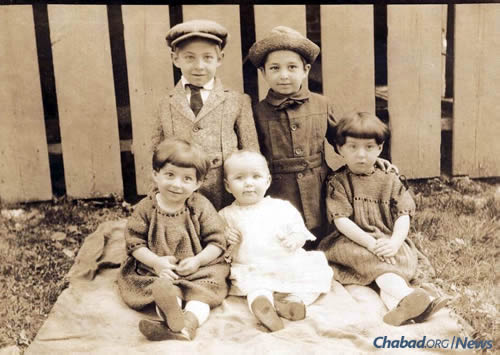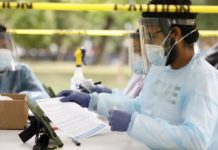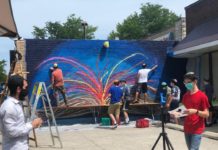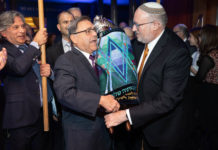Rebbetzin Nechamah Tzipah (Sophie) Goodman, a pioneer of Jewish education in the United States, passed away on Oct. 17 in Israel. She was 95 years old.
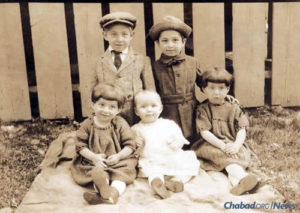
She was the fifth of nine siblings, born in Boston on Aug. 4, 1922, to Rabbi Shmaya and Etta Krinsky. A woman of refinement and few words, she would share her richest memories in her parents’ threadbare, but always happy and boisterous home. She attended Dorcester High, with her Torah learning supplemented by study with her father.
Rabbi Krinsky was a shochet (kosher slaughterer) of renown whose unyielding standards of kashruth occasionally cost him jobs, but earned him the respect of rabbinic leaders from far and wide, including Rabbi J.B. Soloveitchik, Rabbi Eliezer Silver and others.
This upbringing left Goodman with a devotion to mitzvah 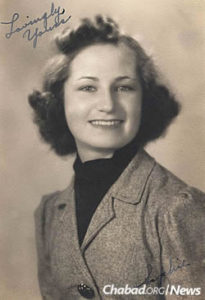 observance and to Chabad customs that remained with her for the rest of her days.
observance and to Chabad customs that remained with her for the rest of her days.
The Krinsky children would sing Chassidic melodies for hours. Years later, Goodman’s fine ear and voice would come into play at the annual Chanukah celebrations for high school girls that she would host in her home.
After marrying Rabbi Yehoshua Nachum Goodman on Jan. 16, 1947, the young couple was sent by the Sixth Rebbe—Rabbi Yosef Yitzchak Schneersohn, of righteous memory—to Lancaster, Pa., and later to New Haven, Conn., where they were both deeply involved in Jewish education.
The couple eventually moved to Chicago, where the rabbi served as principal of the Hannah Sacks Bais Yaakov, then the city’s only Jewish high school for girls.
“I was an out-of-towner,” recalls Dinah Rubinoff, who came from Omaha, Neb., to study in the school in 1971 and now chairs the school’s English department. “Mr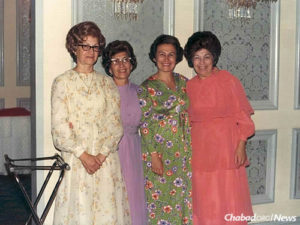 s. Goodman took me under her wing. For example, she made sure to invite me for the Purim meal. She also asked me what foods I remembered from home. I told her that my mother made kreplach [dumplings] for Purim, so she made kreplach for me. They were lovely meals.”
s. Goodman took me under her wing. For example, she made sure to invite me for the Purim meal. She also asked me what foods I remembered from home. I told her that my mother made kreplach [dumplings] for Purim, so she made kreplach for me. They were lovely meals.”
Although she did not have an official position in the school, her presence was known and appreciated by all. Former students still cherish their memories of the annual Chanukah celebrations the Goodmans would host in their home for the entire student body.
Goodman would spend weeks carefully preparing for the event, which included making latkes and other homemade Chanukah delicacies, taking great care with the decor and atmosphere to ensure that the students would feel right at home.
“Rabbi Goodman would give a short talk and quietly leave,” says Rebbetzin Chani Belsky, a former student who is now administrator at the Hannah Sacks Bais Yaakov school. “The singing, the dancing, the camaraderie . . . there were 80 girls in their small home, and it was such a beautiful party—a big farbrengen.”
“She was a real queen, always smiling and greeting you with such warmth. You could tell that she was genuinely happy to meet a former student. A Chabad Chassid, Rabbi Goodman tried to imbue in us the warmth of Yiddishkeit and a love of Torah. Rebbetzin Goodman carried that out, too.”
“Rebbetzin Goodman did things quietly from behind the scenes,” says Rebbetzin Tova Segal, a former Hannah Sacks Bais Yaakov student whose mother, Rebbetzin Ella Soloveichik, taught in in the school for decades. Regarding the annual Chanukah celebration, she recalls that “it was a big deal; it gathered a big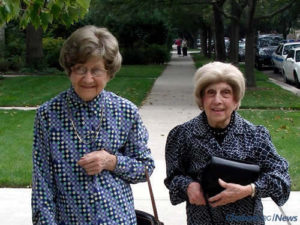 crowd. She was able to greet us all. It was very nice.”
crowd. She was able to greet us all. It was very nice.”
Leading by Example
Rebbetzin Esther Rochel Moscowitz, who came to Chicago in 1976 with her late husband, Rabbi Daniel Moscowitz, former regional director of Lubavitch Chabad of Illinois, remembers her as a model of humility, strength and faith. “She had a unique blend. On one hand, she was so humble and self-effacing. At the same time, she was strong, proud and confident as a Chassid, particular to keep every mitzvah and every custom just so.
Together with her sister, Rebbetzin Chava Devora Shusterman, and Rebbetzin Chayah Sarah Hecht, she took an active (yet always discreet) role in leading Nshei Chabad, providing learning opportunities and inspirational programming for Jewish women in the city.
Along with her husband, Goodman was steadfast in her determination to raise her family in the ways of Chabad. Though they suffered a number of great personal tragedies, the couple never drew attention to themselves and focused on others, leading by example as well as with their community involvement.
Despite their modest wages and way of life, the Goodmans liked to give secretly to people they knew were going through hard times. The rabbi would quietly leave an envelope of cash under their doors or find other ways in which to help people discretely.
The couple was once even audited by the IRS because the amount of charitable deductions on their tax return was most unusual. But Goodman kept meticulous records and held on to all the receipts. When she showed them to the agents, they threw up their hands in admiring “surrender,” expressing admiration both for her record-keeping and their tzedakah (charitable giving).
Goodman was a lifelong student of Torah, meticulously learning the daily study regimen instituted by her beloved Rebbes, as well as attending numerous classes. “She was particular about which classes she would attend,” says Fruma Kulik, a close friend and neighbor. “She needed to check it out to make sure the presenter was up to par, but then she would attend regularly.”
After her husband passed away in 1996, she continued to live in her home and maintained her independence well into her 90s. When she was in her 80s, she took students of the Lubavitch Girls High School into her home. She was able to provide them with firsthand accounts of Judaism in the early part of the 20th century, and they provided her children with the comfort of knowing that their mother was not alone.
When she got older and found it hard to walk to services on Shabbat and Jewish holidays, she relished attending synagogue on Hoshanah Rabbah, the seventh day of Sukkot, when driving is permitted but the prayer services are somewhat longer and more festive.
Goodman is survived by her children: Brachah Devorah LeahShmotkin (Milwaukee); Rabbi Shneur Goodman (Ashdod, Israel); and Sarah Hazan (Rome, Italy); in addition to many grandchildren and great-grandchildren. She is also survived by her brother, Rabbi Yehuda Krinsky, and sister, Yocheved Goldberg.
She was predeceased by siblings Rabbi Velvel Krinsky, Rivka Hecht, Rabbi Moshe Krinsky, Chava Shusterman, Rabbi YosefKrinsky and Rabbi Pinchas Krinsky.
The funeral took place in Israel.
Reprinted with permission from Chabad.org

